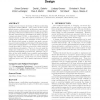Free Online Productivity Tools
i2Speak
i2Symbol
i2OCR
iTex2Img
iWeb2Print
iWeb2Shot
i2Type
iPdf2Split
iPdf2Merge
i2Bopomofo
i2Arabic
i2Style
i2Image
i2PDF
iLatex2Rtf
Sci2ools
SPAA
2004
ACM
2004
ACM
DCAS is not a silver bullet for nonblocking algorithm design
Despite years of research, the design of efficient nonblocking algorithms remains difficult. A key reason is that current shared-memory multiprocessor architectures support only single-location synchronisation primitives such as compareand-swap (CAS) and load-linked/store-conditional (LL/SC). Recently researchers have investigated the utility of doublecompare-and-swap (DCAS)—a generalisation of CAS that supports atomic access to two memory locations—in overcoming these problems. We summarise recent research in this direction and present a detailed case study concerning a previously published nonblocking DCAS-based doubleended queue implementation. Our summary and case study clearly show that DCAS does not provide a silver bullet for nonblocking synchronisation. That is, it does not make the design and verification of even mundane nonblocking data structures with desirable properties easy. Therefore, our position is that while slightly more powerful synchronisation primitives can ...
Distributed And Parallel Computing | Efficient Nonblocking Algorithms | Single-location Synchronisation Primitives | SPAA 2004 | Synchronisation Primitives |
| Added | 30 Jun 2010 |
| Updated | 30 Jun 2010 |
| Type | Conference |
| Year | 2004 |
| Where | SPAA |
| Authors | Simon Doherty, David Detlefs, Lindsay Groves, Christine H. Flood, Victor Luchangco, Paul A. Martin, Mark Moir, Nir Shavit, Guy L. Steele Jr. |
Comments (0)

